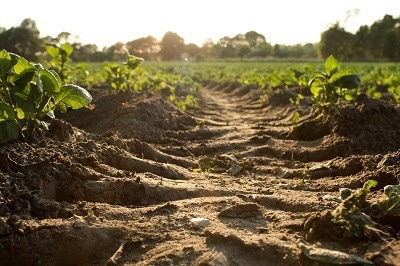Researchers at Staffordshire University are conducting studies to determine the extent of plastic pollution in agricultural soils and its global effects.
 Staffordshire University is investigating the impact of plastic pollution in agricultural soils. Image Credit: Staffordshire University.
Staffordshire University is investigating the impact of plastic pollution in agricultural soils. Image Credit: Staffordshire University.
We know a lot about microplastics in oceans and freshwater and we are starting to learn more about microplastics in the air, but we still know very little about microplastics in terrestrial environments. With climate change, the pressure of increasing populations on food production and risks to food security, it has become apparent that it is incredibly important that we look into this.
Claire Gwinnett, Professor, Forensic and Environmental Science, Staffordshire University
The usage of plastics in agriculture has greatly expanded over the last few years. However, it could take up to 300 years for microplastics in the soil to disintegrate entirely. Microplastics are thought to play a role in crop-reducing effects because their presence modifies soil properties like structure, water-holding capacity, and microbial populations.
The Staffordshire Forensic Fibres and Microplastic Research Group has been working on a number of studies, including a global analysis of the effects of plastic pollution in rural areas, which emphasizes the need for a more thorough investigation of terrestrial microplastics to help lessen the risks to the environment and public health.
We know that microplastics in agricultural soils are abundant, varied, and are influenced by land use and farming activities. We know from a small number of studies that it can affect organisms living in the soil such as worms and springtails.
Claire Gwinnett, Professor, Forensic and Environmental Science, Staffordshire University
Professor Gwinnett adds, “Studies on the effect of microplastics on plants are even rarer but we also know that it impacts crops grown in these environments as well as livestock living there. What we need to know now is how much plastic there is and to better understand what effect this is having.”
A number of studies on the effects of microplastics on common UK agricultural crops are now being conducted by Ellie Harrison, a Ph.D. researcher with the Staffordshire Forensic Fibres and Microplastic Research Group.
Research into the impacts of microplastics in the agricultural soils conducted at Staffordshire University has shown that this pollutant can cause a decrease in germination rate and changes to seed production which could have negative consequences for food production.
Ellie Harrison, Ph.D. Researcher, Forensic Fibres and Microplastic Research Group, Staffordshire University
“Greenhouse films and irrigation piping are products commonly used in farming and we have the same plastic uses in the UK and across Europe. Instead of being removed, these plastic products are often left in fields where they experience wear and tear and degradation from the sun which breaks these plastics down into secondary microplastics,” explained Professor Gwinnett.
Professor Gwinnett adds, “Our results show that from years and years of using these plastics, microplastics are accumulating in the soil and cannot be removed.”
Soil samples were collected from 10 different locations in the Adana/Karataş region in Turkey. The amount of micro-, meso-, macro-, and megaplastics that were recognized in the soil where greenhouse film and irrigation piping was used was about 47, 78, 17, and 1.2-times higher than in farmlands that did not use plastic, respectively.
These observations indicate that residual plastics were less in the soil where used plastics were removed after usage. The findings aim to guide farmers on how to better manage their use of plastics.
An investigation of the number of plastics from irrigation pipes and disposable greenhouse plastic films in Turkish agricultural soils was recently completed in collaboration with Çukurova University.
Similar research has been carried out in the UK by Staffordshire University in collaboration with the National Farmers' Union (NFU); this study examines the quantity and varieties of microplastic in UK agricultural soils. This is the first study of its kind to be conducted in the UK, and its goal is to learn more about how widespread microplastic pollution is in agricultural areas.
“Plastic usage in the agricultural sector may have worthy benefits in the short term, but the long-term effects cannot be ignored. We hope that our growing body of research can be used to inform decision makers and kickstart real change to safeguard soil health and the future of the farming,” concludes Professor Gwinnett.
Journal Reference:
Gündoğdu, R., et al. (2022) Plastics derived from disposable greenhouse plastic films and irrigation pipes in agricultural soils: a case study from Turkey. Environmental Science and Pollution Research. doi.org/10.1007/s11356-022-21911-6.